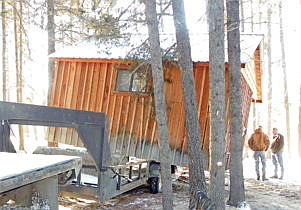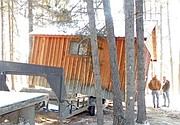Yaak land dispute continues in court
A months-long dispute between the owners of the Dirty Shame Saloon and The Yaak River Tavern & Mercantile involving the ownership of a cabin situated on both sides of their adjacent property lines continues in the form of a lawsuit between the two parties.
John Runkle, owner of the Dirty Shame, and Duane Allen, son of Tavern & Mercantile owner Gwen Allen, have been tangled in litigation concerning ownership of a cabin located on both properties. Runkle filed a lawsuit in Lincoln County District Court claiming Duane Allen illegally removed the cabin and damaged his personal property in the process.
Lincoln County District Judge James Wheelis issued a summary judgment on Aug. 7 in the case in favor of Allen. Runkle appealed the decision to the Montana Supreme Court.
Allen purchased the five-acre parcel, inclusive of six cabins, next to the Dirty Shame Saloon last year after Runkle’s unsuccessful attempt to purchase the property. Both Runkle and Allen knew there was a property line dispute concerning one of the cabins and Runkle was making a claim of ownership of that cabin.
Runkle claimed he and Allen agreed to a verbal contract with a deputy from the Lincoln County Sheriff’s Office on Dec. 14, 2013, stating that the issue would be handled through a civil court system. A lock was placed on the cabin until further inspection could determine the rightful owner.
Runkel claimed that in December 2013, Allen and an alleged accomplice, Geoff Decker, cut the lock on the cabin, removed the ‘No Trespassing’ signs and uprooted the building to place it entirely on Allen’s property.
Following this event, Runkle filed the District Court lawsuit against Allen for breach of contract, property damage, conversion of personal property, slander of title, intentional infliction of emotional distress, treble damages and trespass.
“We have a real Hatfield-and-McCoy thing going on down here,” Runkle said. “I’m not happy that I had to take legal action, but it was really the only road available.”
Damages to the cabin are beyond repair as it was determined that the cost to rehabilitate the building would be in excess of the value of the structure. A porch and deck that were once attached to the cabin were left in shambles on Runkle’s property after being ripped from the foundation.
Runkle estimated damages at $35,000 in his complaint as he had furnishings in the cabin at the time of its removal. Those furnishings included: propane lines, propane heaters, propane lights, windows and fixtures.
In Allen’s brief in support of motion for summary judgment, it was stated that Allen and Runkle never mutually participated in any discussions with the Sheriff’s Office, but the motion to dismiss the case was denied.
Wheelis dismissed Runkle’s claim that there was a breach of contract because of Runkle’s own admission that there was no communication between him and Allen. According to state law, the essential elements of a contract a free, mutual consent that is communicated by each other.
Wheelis also dismissed claims for trespass because Runkle was unable to prove that Allen intentionally entered onto Runkle’s property.
A survey of the property located the true property line and found that a portion of the cabin was located on Allen’s property, according to court documents. The fact that the entrance and porch of the cabin was located on Runkle’s property failed to establish ownership in the structure on Allen’s property, Wheelis ruled, thus the fact that Allen moved the cabin can’t be considered trespass.
Wheelis also ruled that Runkle is not entitled to damages in the case including for Runkle’s personal property that was located inside the cabin.



